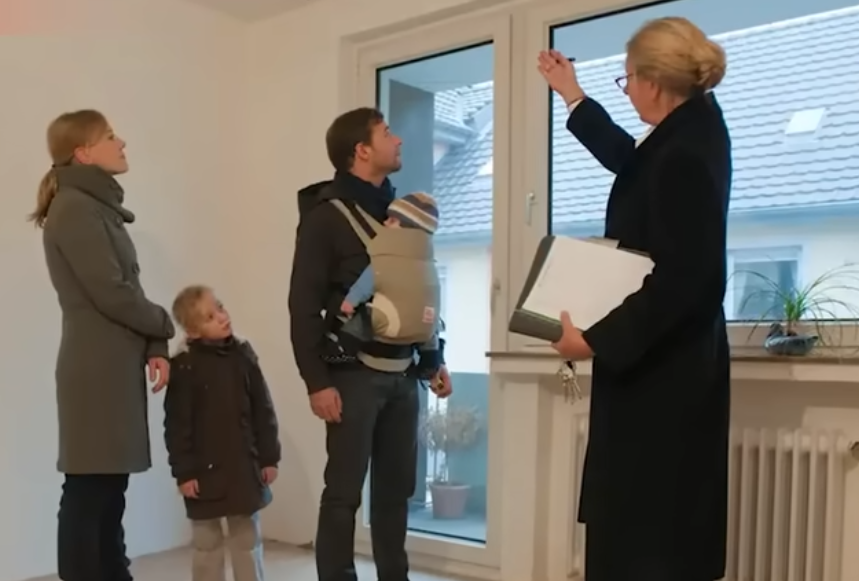In Vietnam, the mindset of settling down and establishing a career is not just a saying but also a way of life, something that has become ingrained in the very fabric of many generations. Buying a house is not just about having a place to live but also about affirming one's position in society. It is about feeling safe, stable, and leaving a legacy, leaving assets for future generations. For Vietnamese people, a house is not just four walls but a symbol of success, of maturity, getting married, buying a buffalo, and building a home. But in Germany, it is different; in Germany, everything is thought of in a way that is completely unlike Vietnam.
Germans do not see home ownership, buying a house, or having a home as the greatest goal in their lives. According to statistics, more than half of Germans living in apartments are renting, and in major cities like Berlin, Hamburg, or Munich, this number can reach 70-80%. Renting a house in Germany is not just a choice but a lifestyle that is almost default.
What makes Germans love renting so much?

Let's delve into each reason. The first reason is the historical context. Germany was involved in World War II and they lost. When World War II ended, Germany was almost reduced to a massive pile of rubble. The Allied bombing campaigns flattened most of the major cities. Berlin was about 80% destroyed in the central area. Many neighborhoods were left with only foundations and piles of bricks. Other cities like Dresden almost disappeared from the map. Places like Hamburg, Frankfurt, or Munich also suffered similar fates. Nationally, it is estimated that over 2.25 million apartments were completely destroyed and an additional 2 million were heavily damaged.
In other words, nearly half of Germany's housing stock before the war vanished within a few years of bombings. After the war, the population of Germany was around 40 to 45 million people, and the post-war period was very tough with not many jobs available. They were forced to flock to major cities to find work and housing. But the infrastructure was almost non-existent. In some places, three or four families had to live together in a small apartment with only two or three rooms. The destroyed neighborhoods were temporarily rebuilt with bricks, wood, and makeshift houses.
The government faced a massive task of both rebuilding the economy and addressing housing for millions of people. In that context, the West German government chose a strategy of building affordable rental housing. The Federal Housing Act, enacted in the late 1940s, aimed to prioritize the development of social housing. This was the quickest and cheapest way to meet the housing needs of the people. Building multi-story rental apartments could accommodate more people and reduce costs per capita.
Renting also helped curb real estate speculation and allowed the state to effectively control prices. Thus, millions of Germans had homes, and millions of post-war individuals grew up in such social housing or apartment complexes. This has formed a sustainable habit. Renting a home no longer carries a temporary connotation but has become a norm. Parents rent for a lifetime, and children grow up continuing to rent. No one feels the pressure to buy a house as in many other countries.

History is the beginning, and when it comes to buying or renting, it also involves a price, something that is always very practical. This is one of the biggest reasons why Germans prefer renting. This is because the rental market in Germany is very stable and protected by an extremely strict legal system. Simply put, renting in Germany is not like in Vietnam, where you can suddenly have your rent increased by the landlord or be asked to leave at any time.
In Germany, everything is clearly regulated, helping renters feel secure as if they are living in their own home. First, Germany has rent control laws. This law is applied in many major cities like Berlin, Hamburg, Munich, or Cologne. It ensures that rent prices cannot be raised excessively compared to the average price in that area. For example, if a two-bedroom apartment in Berlin has an average rent of 800 euros per month, the landlord cannot arbitrarily raise it to 1200 euros just because the market is hot. If they try to do so, you can sue them and demand a reduction to a reasonable rent.
This law helps renters easily plan their long-term finances and not worry about being shocked by skyrocketing rents. When you rent, you know the price will be stable and you won't fear sudden increases. Another point is that rental contracts in Germany are often indefinite. This means you can stay in that apartment as long as you like, as long as you pay the rent on time and do not violate the contract. Some Germans rent an apartment from a young age until they are old, living there for decades without issues. Does the landlord want to terminate the contract? It's not easy. They must have a valid reason, such as needing the apartment for their family or you seriously violating the contract, for example, not paying rent for several months.
Even in these cases, landlords must give notice at least a few months in advance, depending on how long you have rented. In some cases, they even have to compensate you to give you a chance to find a new place. Compared to Vietnam, where the rental market is still quite loose, renting in Germany provides a sense of security almost equivalent to owning a home, as if it were your own. In Vietnam, if a landlord wants to reclaim their house, they only need to give one month's notice or arbitrarily increase the rent, leaving renters in a constant state of uncertainty and anxiety.
In Germany, you can feel secure in your rented home without worrying about being disturbed. This is one of the major reasons why Germans do not feel pressured to buy a house; they just rent comfortably. And this has formed a lifestyle among Germans. Germans, especially the younger generation, value the ability to move easily, not being tied down to one place. This is a country with a developed economy and many job opportunities in different cities. Renting allows them to easily change their living situation when needed without being bound by a long-term mortgage or the difficulties of selling a house.
Imagine you are an engineer or work in any profession in Berlin, for example. One day, you receive a job offer in Munich with a higher salary. You feel very eager to move there for work. If you own a house in Berlin, you would have to worry about how to sell it, find a buyer, or even take a loss if the real estate market is declining. But if you are renting, everything is much simpler; you just need to notify the landlord a few months in advance, pay the rent, and then pack your bags and go.

In Munich, you continue to rent a new apartment. That's it; there is no hassle. In Vietnam, this might be a bit difficult. In Vietnam, the mindset of stability still prevails. Once you buy a house, Vietnamese people often think they will live there for a lifetime or at least for a very long time. Moving to another city is often seen as inconvenient and unnecessary. Not to mention that in Vietnam, job mobility between major cities like Hanoi, Ho Chi Minh City, or Da Nang is probably not as common as in Germany, where cities all have attractive job opportunities and are more conveniently connected than in Vietnam. As a result, Germans choose to rent to maintain their freedom and flexibility in their modern lives.
And there is another fact that buying a house in Germany is very expensive.

Housing is expensive everywhere, and housing in Germany is no less expensive compared to the average income, similar to how we compare housing in Vietnam. Moreover, when buying a house in Germany, you also have to pay a series of additional costs. First is the property transfer tax, which ranges from 3.5% to 6.5% of the apartment's value, depending on the bank. Then there are notary fees, usually around 1% to 2% of the house's value. Brokerage fees can be up to 7% if you buy through a real estate company. Roughly speaking, buying a house for 800,000 euros could incur an additional 80,000 to 100,000 euros in these types of costs.
Not to mention you also have to pay for repairs and maintenance after buying. Because many houses in Germany, especially old ones, need renovation before moving in. If you do not have enough money to buy a house outright, you will have to take out a mortgage. So if your income is unstable or the real estate market is also unstable, you could end up in a situation of overwhelming debt. Compared to renting, where you only need to pay a fixed amount each month without worrying about additional costs, buying a house has too many weaknesses. Another interesting point in Germany is that society does not judge you based on whether you own a house or not. In Vietnam, if you are older and still renting, it can be somewhat inconvenient. And young men nowadays without a house, to be honest, in the city, it is also harder to get married.
But in Germany, renting is completely normal, even for high-income individuals like doctors, lawyers, or engineers. In Germany, people care about quality of life, personal freedom. How to live, how to live happily, how to live comfortably. More than whether you hold a property title or own a house. If you look deeper, you will see that renting in Germany is not just a practical choice but also a part of the culture, of the lifestyle. Germans value practicality and personal freedom. For them, life is not a race to own as many assets as possible but to live comfortably, enjoy what they have, and not be bound by unnecessary things.

Renting helps them achieve that. They have stable housing but still maintain the flexibility to change, explore, and live the way they want. In contrast, in Vietnam, the culture of settling down reflects a traditional society where family and long-term stability are prioritized. A house is not just a place to live but also a home that connects generations. However, this also creates significant pressure, especially for the younger generation today, as housing prices continue to rise and buying a house becomes a financial burden not only for them but also for their parents.
